【Menstrual Events】As long as the cycle is regular and menstruation is normal, get along happily with the aunt every month
[ad_1]
Text: He Jianxing Arrangement: Liang Yingxiu
(Kuala Lumpur News) For girls who have entered adolescence, they may love and hate the “big aunt”. What they love is that they have finally entered another growth process, and what they hate are the troubles and discomfort caused by menstruation.
But for doctors, the most important thing is whether the menstrual cycle and menstrual flow exceed the normal range. As long as the situation meets these two principles, it turns out that it is not difficult for women to be good sisters with “big aunts”.
Dr. Tan Sing Yee, a family medicine specialist consultant, pointed out that a mother once brought her 15-year-old daughter to the consultation. At that time, the daughter whispered that her period had not come for a long time. Since menarche 2 years ago, menstruation usually comes every 3 to 4 months, and this time it has been 3 months. The mother is worried that her daughter may not report on time because of her menstruation. In addition, her dark circles are very deep. The body has accumulated too many “toxins”. Therefore, there is this consultation.
“This kind of situation is also one of the common cases in clinics. In the final analysis, it is related to the lack of popularization of health education, especially women’s health.”
Stressful Environments Affect the Menstrual Cycle
According to textbooks, menstruation comes every 28 days. Because of the deep-rooted idea that “28 days is the standard date”, as long as the menstrual period comes a day or two late, or comes early, some girls will start to be suspicious. I was worried about whether there was something wrong with her health. If she only came back every three or four months, she would be regarded as “frail and sickly”, and even called “modern Lin Daiyu”, although no one knew whether Lin Daiyu’s menstruation was normal.
She said that the menstrual period is easily affected by external factors, such as stress, environment, sleep, diet, and even business trips or outings. It is normal for the number of cycle fluctuations to occur within a week. It takes only 35 days to come, or only 22 to 23 days to come, it is normal and it will happen occasionally, so there is no need to worry about it.
“Taking girls as an example, facing year-end exams, lack of sleep, sudden increase in stress, and even anxiety in the face of interpersonal problems will all affect the menstrual cycle.”
Every woman’s menstrual cycle may be different, and regularity is the key. The so-called regularity may be 28 days apart, or 1 month, or two months, or 3 months or even half a year, but every time They are all regular, which can be understood as normal. Therefore, some people have suggested changing menstruation to seasonal menstruation.
And her advice is that there is no need to compare your own menstrual cycle with other sisters and get into distress, unless there are more than 3 cycles with large fluctuations, for example, every time it comes on 28 days, but this time it has been 3 months. If you don’t come, you should find a doctor for diagnosis and find out whether there are hidden gynecological diseases in time.
“Another menstrual topic that affects women is menstrual flow. What is the normal amount? How much should I worry about? It has always been a concern of women, and it is also one of the problems she often encounters in clinics. Generally, the normal menstrual flow is between 5 and 80. Milliliters, which is equivalent to 1 teaspoon to 1 bottle of lactic acid bacteria drink, if the menstrual flow exceeds this range, it can be considered abnormal.”
Non-key changes in menstrual flow are the key
Whenever a female patient asks about menstrual flow, she will list a series of more private questions for them to find out in the answers:
1/ How many sanitary napkins do you use every day?
2/ How long does it take to change a piece of sanitary napkin?
3/ Is each piece soaked?
4/ Do you have abdominal pain during menstruation?
5/ Will the sanitary napkin be soaked when menstrual flow is heavy?
6/ Is it enough to use a pad?
7/ Have you noticed that the amount has decreased or increased by half compared to the last time?
8/ Menstrual flow is not the key point, change is the key
Through the above questions, in addition to allowing the doctor to roughly estimate the amount, it also allows the patient to further understand their own situation.
“Estimated by the amount of sanitary napkins, the normal amount is changed 4 to 5 times a day on average, and each cycle does not exceed 20 pieces; if more than 30 pieces are used and almost every piece of sanitary napkin is soaked, or there are many black lumps, That is, excessive menstrual flow. But if you can’t even use up a pack of sanitary napkins during menstruation, or even use no sanitary napkins at all, and only need pads, then it is hypomenstrual flow.”
She reminded that in fact, the estimation of menstrual flow is somewhat subjective. The key points should be the regularity of menstrual periods and whether the amount of menstruation is very different from before. “It is worth noting that the menstrual flow will also fluctuate due to emotional and environmental factors. If this situation has persisted for several months, it is recommended to consult a doctor for a test.”

Can’t drink cold drinks and eat cold food?
Menstrual taboos have no scientific basis
According to normal calculations, a woman will experience 400 menstrual periods in her lifetime, in other words, there are 2,000 days. However, various taboos on menstruation since ancient times have made many women at a loss during these 2,000 days, so that they must be trembling.
In fact, as long as you have the correct menstrual knowledge, you can feel comfortable and happy physically and mentally during menstruation, and you don’t need to live like a year.
When it comes to menstrual taboos, “do not drink cold drinks”, “do not eat cold food” and “do not wash your hair” rank in the top three, followed by “do not exercise” and “do not have sex”. Is there really such a thing as the five taboos that have been passed down from ear to ear? Or is something wrong?
Cold drinks aggravate dysmenorrhea
Chen Xinyi believes that when women have a deep understanding of the changes in their bodies during menstruation, it would be better for them to decide whether to continue to abide by the taboo.
She pointed out that in the general perception, cold drinks will cause uterine contraction and lead to aggravated dysmenorrhea, so the menstrual blood of uterine contraction cannot flow out and “remain” in the body, but in fact, during menstruation, the cervix will open slightly, and once menstruation occurs, it will stop. The cervix enters the vagina, so menstrual blood does not “stay” in the uterus. For a woman who is not yet pregnant, her uterine capacity is about 5 milliliters, so whether cold drinks cause menstrual blood to “stay” in the uterus, the answer is already very clear.
In addition to cold drinks, so-called “cold” fruits are also listed in the list of taboos, among which pineapple tops the list, followed by pears, watermelons, etc. Among the taboos, these fruits can cause dysmenorrhea.
Eating in moderation is key
From the perspective of Western medicine, dysmenorrhea is due to the action of hormones in the body. During menstruation, prostaglandin, oxytocin, and vasopressin will cause the smooth muscle of the uterus to contract. Together with the shed endometrium, the uterine cavity is squeezed out, and the contraction of uterine smooth muscle is originally out of good intentions.
“However, sometimes it will compress the blood vessels in the uterus, causing short-term blood supply to the uterus. If it contracts violently, it will lead to severe ischemia, and then cause pain. A piece of pineapple and a cup of ice cream are not enough to stimulate hormones.”
In addition, some women also put some foods such as chocolate, coffee, carbonated drinks, and chili on the taboo list. However, if you understand the formation of dysmenorrhea, eating these foods will cause dysmenorrhea or irregular menstrual blood. The key point is that if you eat a large bowl of chili peppers to “self-mutilate” after dysmenorrhea, the doctor can’t do anything about it.

Scrub the vulva with water
Migraine has nothing to do with menstrual shampooing
The saying “Don’t wash your hair during menstruation or you will get migraines” has been told to daughters from grandmothers to mothers, and even this generation. At first glance, it seems reasonable, but from the perspective of menstruation knowledge, its arguments are fundamental Untenable.
First of all, there are many reasons for migraines. According to research, female patients with migraines will still have headaches even if they do not wash their hair during menstruation. Besides, it is hot and humid all year round in Malaysia. If you do not wash your hair for two days, the scalp and hair may smell bad I can’t even accept it myself, let alone others.
Avoid abdominal stress exercises
Chen Xinyi pointed out that in addition to washing the hair, cleaning the private parts is also very important. There is no need to use special detergents, just scrub the vulva with clean water and keep the vulva clean and dry.
The specific steps are to clean the vaginal opening and the folds of labia and labia, and then clean the anus. It must be cleaned from front to back, not back and forth, or reversed from back to front, otherwise the anus will be damaged. bacteria into the vagina.
Do not exercise during menstruation and do not have sex are also listed in the taboos, let’s talk about exercise first, if you usually maintain exercise habits, such as running or walking after meals, it is okay to run as usual during menstruation, but it must be avoided as much as possible Exercises that increase abdominal pressure, such as sit-ups, push-ups or squats, etc., abdominal pressure will compress the uterus, which may cause dysmenorrhea.
“For women who already have dysmenorrhea, heavy menstruation or irregular menstruation, they should avoid such movements. As for strenuous sports such as running and ball games, they can be avoided. Of course, women who have never exercised must do a 100-meter walk during menstruation. Running wild and yoga handstand, besides asking for trouble, I really can’t think of a better adjective.”
And what about those women who have a significant other who can have sex during their periods? From the perspective of Western medicine, it is possible but not encouraged; in general perception, the cervix is open during menstruation, once intercourse there will be a risk of bacterial infection, causing vaginitis or pelvic inflammatory disease, even recorded in “Jin Ping Mei” The tragedy of Li Ping’er bleeding to death during menstruation and Ximen Qing’s intercourse.
Intercourse during menstruation does not increase the risk of infection
However, many modern medical reports have denied the claim that intercourse during menstruation will increase bacterial infections. The etiology of vaginitis and pelvic inflammatory disease is caused by multiple sexual partners and sexually transmitted diseases. Especially many.
There is a saying that having sex during menstruation can be perfect contraception. This is also a statement without scientific basis, because some women’s ovulation period falls during menstruation, so it is not correct to take risks in order to save condoms.
She advises the other half of the women to keep in mind the principle of “Your body is your decision”. If you want to have intercourse during menstruation, it is okay, but it is not encouraged for the sake of hygiene. If it is not “sexual”, then just refuse it.
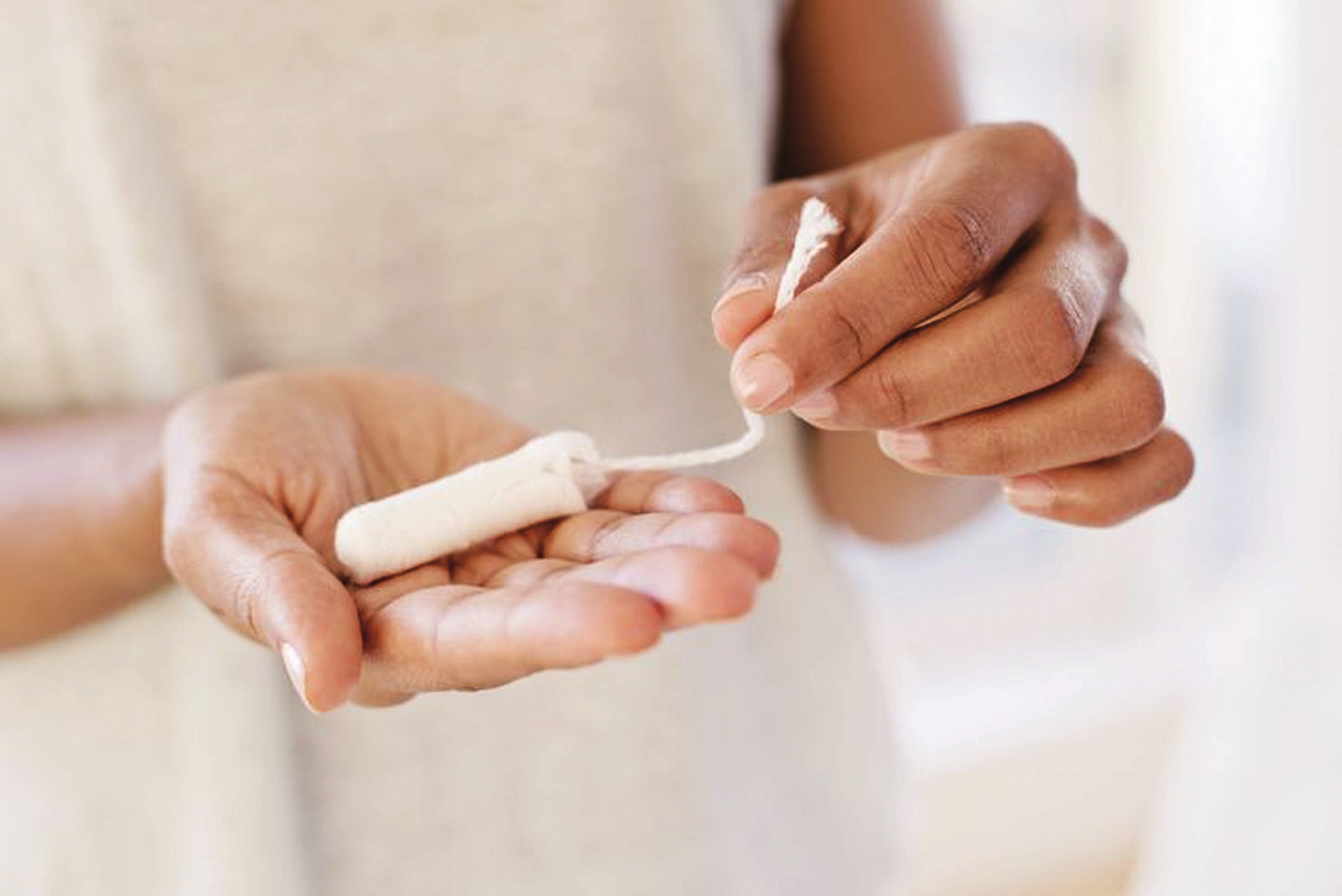
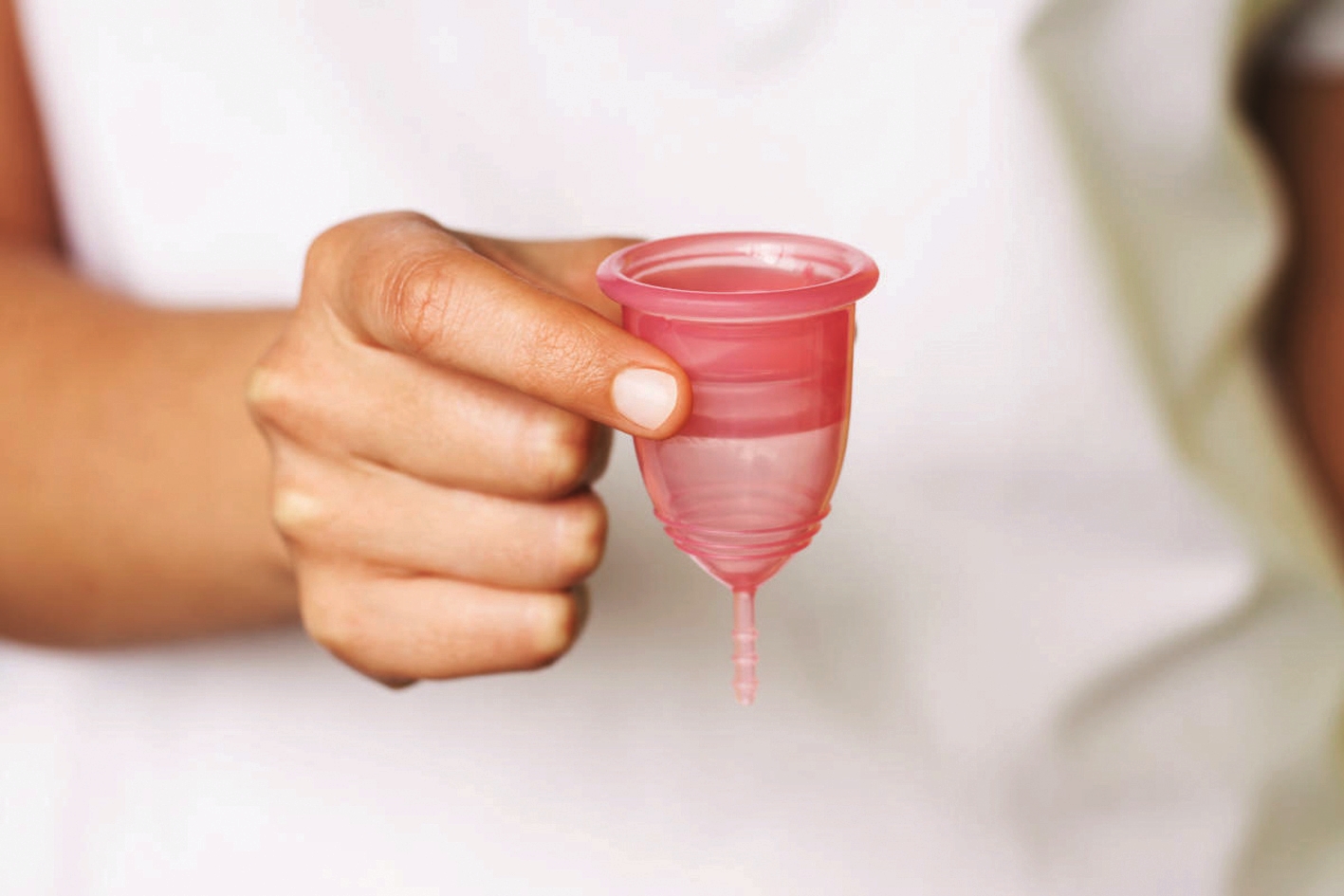
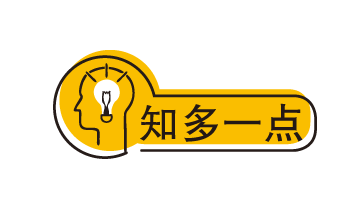
anti-leakage tampons
Low risk of menstrual cup infection
In the past, women could only choose tampons during menstruation, but now there are many options on the market, such as tampons and menstrual cups.
As for which one is more suitable, it depends on the requirements of the user. For example, women who often participate in outdoor sports or swim are more suitable to use tampons.
Tampons (tampons) are more common in European and American countries. It is a kind of sanitary napkin placed in the vagina, which directly absorbs menstrual blood in the body. The absorption is particularly strong, which can prevent leakage and keep the outside body clean and dry. When changing the strips, it must be replaced regularly. If the replacement is not done frequently, infection and inflammation will easily occur, and in severe cases, toxic shock syndrome may even occur.
eco-friendly menstrual cup
As for the menstrual cup, it is a popular menstrual product in recent years. Many people think it is environmentally friendly and economical. It is usually designed in a bell shape, made of silicone or latex, and can be reused. Its principle is to receive it by putting it into the vagina. and collect menstrual blood.
Menstrual cups do not absorb menstrual blood like tampons, and the airtight seal helps to reduce bacteria. Compared with tampons, menstrual cups have a much lower risk of toxic shock and infection, but using menstrual cups is not simple and takes practice. to insert and remove.
Although the visit of the “big aunt” will bring inconvenience and discomfort, it is not difficult for women to manage their own health as long as they master the knowledge of menstruation.
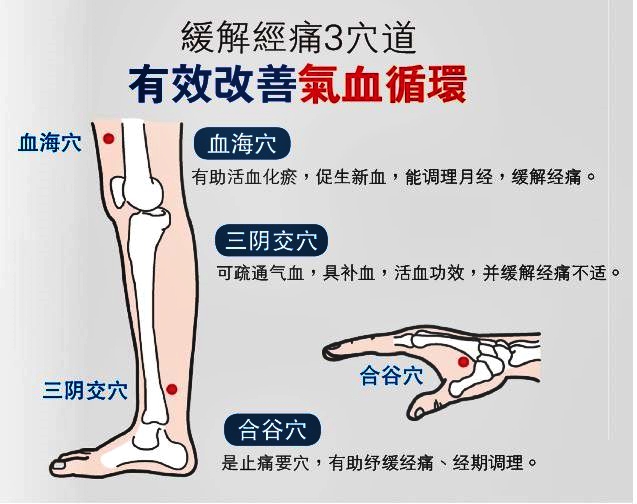
Diet relieves soothing posture Massage acupoints to improve menstrual pain
Many girls are prone to menstrual pain and backache when menstruating, how to relieve it?
What should be paid attention to in menstrual pain diet?
The location of menstrual pain is usually concentrated in the pelvis or lower abdomen. It may be accompanied by discomfort symptoms such as diarrhea, fatigue, dizziness, or headache. It lasts for about 2 to 3 days. In severe cases, symptoms such as nausea and vomiting may even appear.
Menstrual pain can be divided into 2 categories:
1/Primary: 48 hours before the onset of menstruation, the secretion of prostaglandins in the body will reach a high point. Prostaglandins can promote the strong contraction of blood vessels in the endometrium and cause the shedding of the endometrium. This is a normal phenomenon, and some women But it might be painful.
2/Disease factors: Common diseases include pelvic inflammatory disease, endometriosis, uterine fibroids, adenomyosis, uterine polyps, etc. As long as the cause is treated, menstrual pain can be relieved or disappeared.
Relief Suggestion 4 Diet
What can I eat to relieve menstrual pain? The following 5 diets are recommended:
1/ Warm drinks: such as warm water, hot chocolate, red bean soup, warm soybean milk, etc.
2/Chocolate: rich in mineral magnesium, part of the premenstrual syndrome caused by the lack of magnesium in the body, can be relieved by eating some chocolate. Dark chocolate is rich in magnesium. Magnesium can control appetite and stabilize mood. Chocolate can induce “endorphins” and relieve the bad mood of menstrual pain and discomfort.
3/ Antioxidant nutrients (vitamins A, C, E, anthocyanins): Eating more antioxidant vitamins can help eliminate free radicals, reduce inflammation, and relieve the release of prostaglandins, which is also helpful for improving menstrual pain.
Unsaturated fatty acids: help regulate the inflammatory pain response caused by the secretion of prostaglandins during menstruation, such as nuts and fish oil.
4. Calcium: Nutritionist Wu Yingrong pointed out that the uterus will contract and spasm during the menstrual period, causing discomfort, and calcium can relieve muscle tissue, so drinking a cup of hot milk is also helpful.
Dr. Zhang Yuqi also reminded that the following foods should be avoided during menstrual pain and menstruation:
1/Brown sugar water, ginger soup, ginger tea: Ginger and brown sugar have the effect of promoting blood circulation, which will accelerate the discharge of menstrual blood, and a large amount of menstrual blood will be discharged, which may cause blood collapse, anemia, dizziness and other conditions.
2. Stimulant food: spicy food, ice, alcoholic beverages, fried food, etc. Stimulant food will increase uterine contraction, which may cause menstrual pain. In addition, smoking can cause vasoconstriction, affect circulation, and cause menstrual pain.
Pain Relief 2 Poses
1/ Knee-chest lying position: When menstruation comes, it is recommended to sleep in prone position, which will help menstrual blood to flow out naturally and prevent menstrual blood from backflow. Practicing the “knee-chest lying” posture can help relieve menstrual pain. Some women may experience menstrual blood backflow to the pelvic cavity due to retroverted uterus during menstruation, causing menstrual pain and diarrhea. “Knee-chest lying position” can also help improve the retroverted uterus and relieve discomfort.
2/ Cat pose: Cat pose can stretch the spine and pelvic muscles and relieve menstrual pain.
Knee Chest
1/ Kneel on the ground, with your feet spread out to the width of your pelvis; support the ground with your hands, and your hands are the same width as your center.
2/ Stretch your hands forward, place them easily on both sides of your head, lightly touch your chest to the ground, and raise your buttocks naturally.
3/ After 5 minutes, rest.

cat style
1/ Place your hands directly under your shoulders, shoulder-width apart. Kneel down with your knees hip-width apart. The distance between the hands and knees is the same as the length of the upper body torso.
2/ As you inhale, straighten your arms, relax your lower back, open your chest, and lift your chin slightly. Stay in this position for 5 to 10 breaths.
3/ When exhaling, lower your chin close to your chest, arch your back, push your navel toward your spine, and relax your buttocks. You can stay in this position for 5 to 10 breaths.
Obstetrician and gynecologist Zhang Yuqi also suggested that strenuous exercise should be avoided during menstruation, and moderate exercise such as yoga can be used according to one’s own condition, which can also help to improve menstrual pain. Putting warm packs and warm water bags on the stomach and lower abdomen, combined with abdominal breathing, can also help the uterine blood flow more smoothly and improve menstrual pain and discomfort.
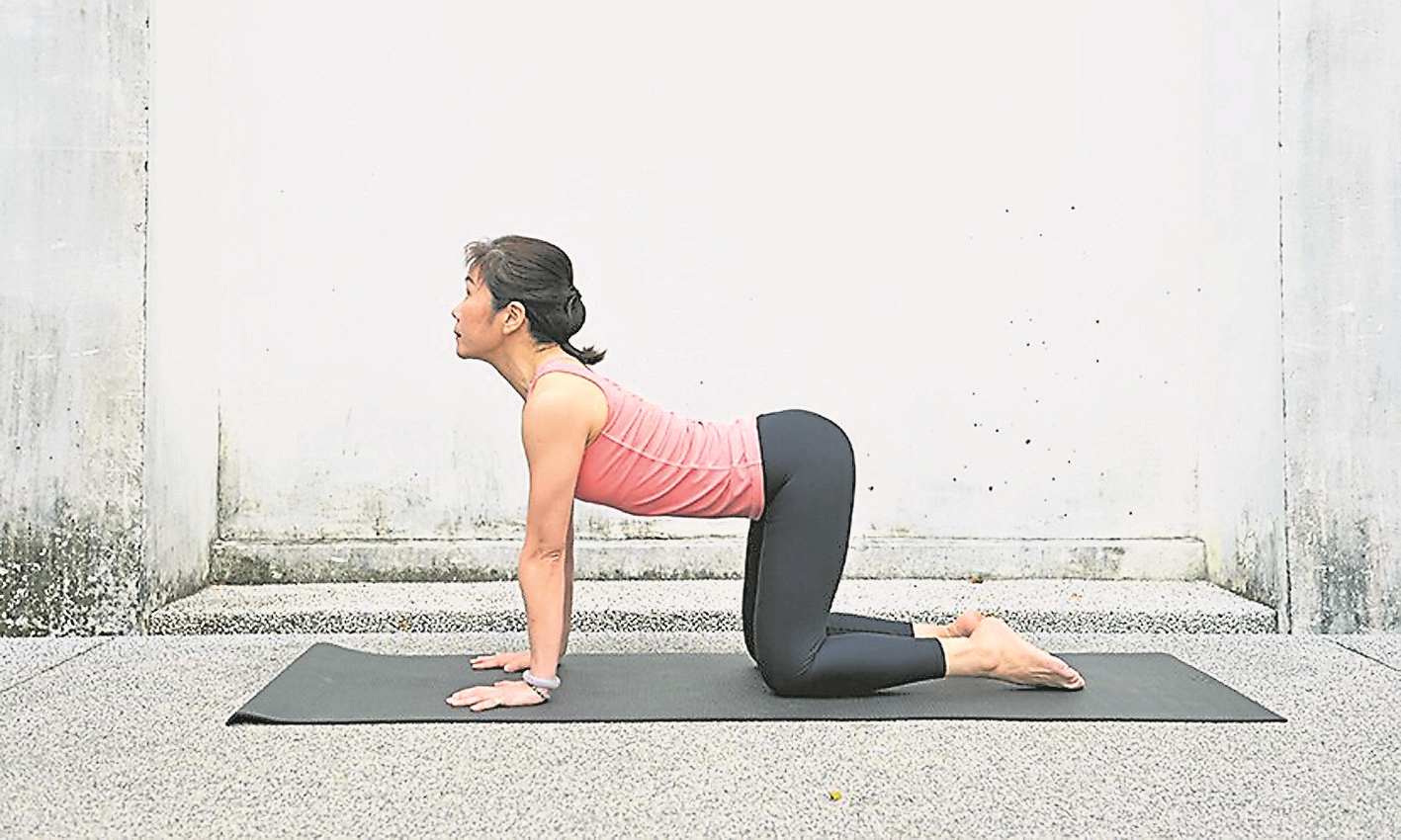
Traditional Chinese Medicine 3 Acupoints Massage
Many women suffer from menstrual disorders, excessive menstrual flow, and menstrual pain. Some even need to take painkillers to relieve pain.
In fact, menstrual pain is mostly caused by the lack of circulation of qi and blood, which can be improved through acupoints in traditional Chinese medicine. The following are 3 acupoints that can help relieve menstrual pain:
◆Xuehai Point: 3 fingers wide from the inner edge of the kneecap, it can promote blood circulation, remove blood stasis, and promote new blood production. It is an important point for women to regulate menstruation and relieve menstrual pain.
◆Hegu Point: Located at the mouth of the tiger where the index finger and thumb intersect. Hegu point is an important point for pain relief, which helps relieve menstrual pain and regulate menstruation.
◆Sanyinjiao Point: 3 inches above the tip of the medial malleolus (about 4 fingers wide). Sanyinjiao point is where the three yin meridians, namely the liver meridian, spleen meridian and kidney meridian, meet.

There are 7 grades
What to do about severe menstrual pain?
Generally speaking, medical personnel will ask the patient to describe the feeling of pain on a scale of 1 to 10, so as to judge the level of menstrual pain. In addition, in the past, the Japanese media divided the degree of menstrual pain into 7 levels, level 1 is the most insensitive, and level 7 is the most serious.
Grade 1/asymptomatic
Level 2/discomfort in the abdomen
Grade 3/slight abdominal pain
Grade 4/Pain like diarrhea
Level 5/ Pain that can’t speak, even accompanied by vomiting, the abdomen seems to be hit
Grade 6/excessive pain to the point of being unable to walk, even blurred vision,
like someone keeps kicking you in the stomach
Level 7/Like being hit continuously by a shot put, barely conscious
Zhang Yuqi suggested that if the pain index exceeds 5 points, or exceeds grade 4 or above, it is usually too painful to speak. When severe menstrual pain, you can take painkillers first to relieve discomfort and avoid worsening pain. You can also consider seeing a doctor , the doctor prescribes anti-inflammatory painkillers, which is more effective in relieving menstrual pain.
Text ◇Ye Yide “Healthy”
[ad_2]
Source link

![[Love Wants Sexual Happiness Series 358]Find the culprit and overcome psychogenic erectile dysfunction. Don’t let pressure affect your sexual happiness.](https://chinathenews.com/wp-content/uploads/2024/04/171111-780x420.jpg)

![[Wanqingyi Care]My health, my rights, customized medical methods in the last stage of life](https://chinathenews.com/wp-content/uploads/2024/04/ZZ1-100-780x420.jpg)
![[Kidney Transplantation Special Topic]The survival rate of transplanted kidneys is high without dialysis treatment three times a week](https://chinathenews.com/wp-content/uploads/2024/04/1311-780x420.jpg)



